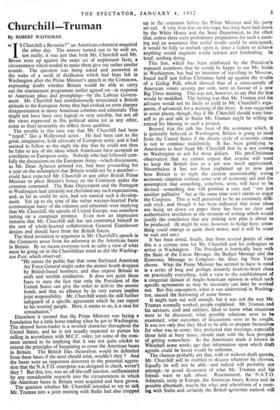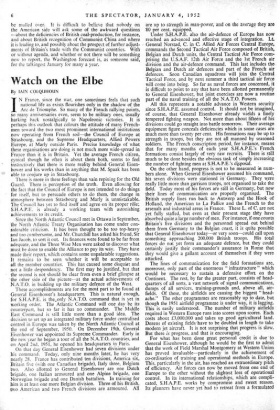Churchill—Truman
I
64 S Churchill a Bevanite?" an American columnist enquired the other day. The answer turned out to be well no, not really; it was just that both Mr. Churchill and Mr. Bevan were up against the same set of unpleasant facts, a circumstance which tended to make them give out rather similar sounds. The question was being asked and answered in the wake of a swell of disillusion which had been felt in Washington after the Prime Minister's speech in the Commons, expressing doubt - whether Britain would be able to carry out the rearmament programme earlier agreed on—in response to American pleas and promptings—by the Labour Govern- ment. Mr. Churchill had simultaneously enunciated a British attitude to the European Army that had evoked an even sharper disappointment in many American columns and editorials. This might not have been very logical or very sensible, but not all the views expressed in this political arena (or in any other, come to that) invariably do reflect those qualities.
The trouble in this case was that Mr. Churchill had been " typed," like a Hollywood actor. He had been cast as the great, imaginative, bold advocate of European unity; and it had seemed to follow as the night the day that he could not then be false to any of the ideas which Americans have accepted as corollaries to European unity. Nobody who had followed care- fully the discussions on the European Army—which discussions, as Mr. Dean Acheson pointed out, had been proceeding for a year on the assumption that Britain would not be a member— could have expected Mr. Churchill or any other British Prime Minister to place Britain's forces on the Continent under the common command. The State Department and the Pentagon in Washington had certainly not cherished any such expectations, and, as far as could be seen, had not wanted such a develop- ment. Yet up to the time of the rather warmer-hearted Paris communiqué many of the columns and editorials were implying that Mr. Churchill, the apostle of United Europe, was somehow ratting on a campaign promise. Even now an impression remains that Mr. Churchill still has not committed himself to the sort of whole-hearted collaboration General Eisenhower desires and should have from the British forces.
The third invitation to argument in Mr. Churchill's speech in the Commons arose from his reference to the American bases in Britain. By no means everyone took as calm a view of what must be going on in the Churchillian mind as did the Washing- ton Post, which observed : "He senses the public fear that some firebrand American Air Force General might order the atomic bomb dropped by British-based bombers, and thus expose Britain to swift and terrible retaliation. It does not quiet these fears to state the fact that only the President of the United States can give the order to deliver the atomic bomb, and that an alliance by its very nature implies joint responsibility. Mr. Churchill wants the still further safeguard of a specific agreement which he can report to his worried people. Here, it seems to us, is a case for consultation."
Elsewhere it seemed that the Prime Minister was laying a foundation for a little horse-trading when he got to Washington. The shrewd horse-trader is a revered character throughout the United States, and he is not usually expected to pursue his calling in accordance with M.C.C. rules; yet some of the com- ment seemed to be implying that it was not quite cricket to extend the principles of bargaining to cover the American bases in Britain. The British Isles themselves would be defended from these bases if the need should arise, wouldn't they ? And the bases were an important deterrent to the potential aggres- sion that the N.A.T.O. enterprise was designed to check, weren't they ? But this, too, was an off-the-cuff reaction, unilluminated by any considerable research into the circumstances in which the American bases in Britain were acquired and have grown.
The question whether Mr. Churchill intended to try to talk Mr. Truman into a joint meeting with Stalin had also cropped up in the comment before the Prime Minister and his party set sail. A very firm line on this topic has long been laid down by the White House and the State Department, to the effect that, unless there were preliminary preparation for such a meet- ing and an assurance that useful results could be anticipated. it would be folly to embark upon it, since a failure to achieve anything would augment world tension and foreboding. In brief, nothing doing.
This line, which has been reinforced by the President's repeated assertions that he would be happy to see Mr. Stalin in Washington, but had no intention of travelling to Moscow, found itself just before Christmas hard up against the results of a Gallup Poll, which showed that of a cross-sample of American voters seventy per cent. were in favour of a new Big Three meeting. This was not, however, to say that the line would be modified. The betting was that Mr. Truman and his advisers would not be likely to yield to Mr. Churchill's argu- ments, if advanced, for a meeting of the three. It was suggested in some places, though, that if Mr. Churchill should want him- self to go and talk to Stalin Mr. Truman might be willing to extend his blessing to such a project.
Beyond that the talk has been of the assistance which, it is generally believed in Washington, Britain is going to need from the United States if the dreary cycle of economic crises is not to continue indefinitely. It has been gratifying to Americans to hear from Mr. Churchill that he is not coming to Washington to ask for more doliars. His pre-Christmas observation that we cannot expect that anyone will want to keep the British lion as a pet was much appreciated.
Nevertheless it has not been explained up to now just how Britain is to right the current unmistakably wrong economic situation without some sort of economic aid and the assumption that something, somehow, soon, will have to be devised—something that will promise a cure and " not just another palliative " but at the same time won't alarm or anger the Congress. This is well perceived to be an extremely diffi- cult trick, and though it has been indicated that some ideas are being set down on paper there has been no clear and authoritative revelation at the moment of writing which would justify the conclusion that any striking new plan is about to be produced. (It might be wise, however, to hedge here; some- thing could emerge at quite short notice, and it will be wiser to wait and see.) It has been noted, finally, that from several points of view this is a curious time for Mr. Churchill and his colleagues to arrive in Washington. The President is frantically busy with the State of the Union Message, the Budge& Message and the Economic Message to Congress—his three big New Year chores. What the Prime Minister has seemed to have in mind is a series of long and perhaps leisurely heart-to-heart chats on practically everything, with a view to the establishment of a congenial climate of Anglo-American opinion in which such specific agreements as may be necessary can later be worked out. But this conception, when it was understood in Washing- ton, caused the furrowing of some brows.
It might turn out well enough, but it was not the way Mr. Truman normally worked, people explained. Mr. Truman and his advisers, civil and military, liked to know what situations were to be discussed, what possible solutions were to be examined, what outcomes of discussions were to be sought.
It was not only that they liked to be able to prepare themselves for what was to come; they preferred that meetings, especially those held at busy times, should start with the best prospect of getting somewhere. So the Americans made it known in Whitehall some weeks ago that information upon which draft agenda could be based would be welcome.
The chances probably are that, with or without draft agenda, Mr. Churchill will be enabled to discuss whatever he chooses.
Equally he will not be able—and indeed will probably not attempt—to avoid discussion of what Mr. Truman and his friends want to talk about. Rearmament, the- N.A.T.O. Admirals, unity in Europe, the American bases, Korea and its possible aftermath, maybe the whys and wherefores of a meet- ing with Stalin and certainly the British eionornic outlook will be mulled over. It is difficult to believe that nobody on the American side will ask some of the awkward questions —about the deficiencies of British coal-production, for instance, and about British recognition of Communist China and where it is leading to, and possibly about the prospect of further adjust- ments of Britain's trade with the Communist countries. With or without agenda, and whether or not there will be something new to report, the Washington forecast is, as someone said, for the talkingest January for many a year.







































 Previous page
Previous page